Helen Lowe's Blog, page 292
July 9, 2011
Six Great Heroes of Epic Fantasy, Part 2
On Friday 8 I posted the first instalment of my line up for Six Great Heroes of Epic Fantasy: Astrin Ymris (Patricia McKillip's The Riddlemaster of Hed trilogy), Coltaine (Steven Erikson's Deadhouse Gates), and Druss the Legend (David Gemmell's Legend.)
I also suggested that there might be a seventh or bonus hero and so it has proven to be because, to continue in alphabetical order, I just could not leave out—
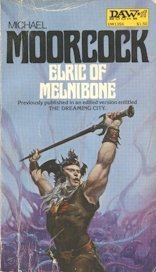 E which is for Elric of Melnibone, renegade emperor, outcast, warrior-sorcerer, god-slayer and defender of free will, from Michael Moorcock's Elric series, which starts with Elric of Melnibone.
E which is for Elric of Melnibone, renegade emperor, outcast, warrior-sorcerer, god-slayer and defender of free will, from Michael Moorcock's Elric series, which starts with Elric of Melnibone.
Now I know that some of you may argue that Elric isn't even a hero—he is in fact the quintessential antihero. And I could just say that I don't care and am including him anyway, simply because Elric seized my imagination so powerfully as a very young SFF reader. I will, however, make my case for Elric being a hero—besides simply being the possessor of a deadly, soul-sucking sword called Stormbringer (if you love "elves" with soulsucking swords—forget Cherryh's Morgaine or Erikson's Anamander Rake: think, Elric.)
Elric is certainly a chaotic force and possesses a certain moral ambiguity, or perhaps it would be more correct to say that he is a practitioner of realpolitik, but he is also a champion of free will, particularly against the gods of chaos that are seeking to take over the human realm. So certainly, in the sense of "hero-protagonist" Elric is one of the outstanding heroes of epic fantasy and I believe has to be on my list.
In terms of what makes him most interesting … I think for me it is his championing of free will, when fate, portent, and doom are such strong threads in much fantasy (deriving I believe, from its roots in mythology and folklore.) Elric definitely challenges and overturns that model.
—
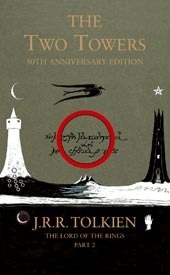 F is for Faramir, second son of the Steward of Gondor and head of the rangers of Ithilien in JRR Tolkien's The Lord of the Rings.
F is for Faramir, second son of the Steward of Gondor and head of the rangers of Ithilien in JRR Tolkien's The Lord of the Rings.
Those of you who have only seen the film version of The Lord of the Rings may well cry: "but surely you should choose Aragorn or Legolas, or even (Sean Bean as) Boromir, not Faramir." I think those who have read the novel, however, will be less surprised by my choice.
Faramir first appears in The Two Towers, as captain of Gondor's rangers in Ithilien, a territory on the border of Mordor. From the first time I read it, I felt that he was one of the strongest and most real characters in the book—something that really didn't come across in the films and was one of my most keenly felt disappointments in relation to the big screen treatment of the story.
The Faramir of the book is much more human and less 'high and remote' than Aragorn, but like both Aragorn and Galadriel, he also refuses the temptation of the one ring of Sauron—something his older brother, Boromir, was unable to do. So Faramir shows himself to have both insight—he is smart enough to know that taking the ring will ultimately do him and Gondor no good—as well as the strength of will and moral integrity necessary to refuse the ring.
I also like Faramir because although he is, of necessity, a soldier in the cause of Gondor, he values the benefits of peace and civilization, such as learning and healing, above the arts of war. He also holds to his duty despite the mistrust of his father (the films got that right), but not stupidly, ie not the forlorn, suicidal charge to certain death of the films, but rather in holding together a fighting retreat from Osgiliath 'against the odds.'
In the book, Faramir is a quiet character, but a very strong one, not because of his deeds of arms but because of his moral character. And because he is a more everyday character than the more remote figure of Aragorn, he is also a character that we can relate to.
—
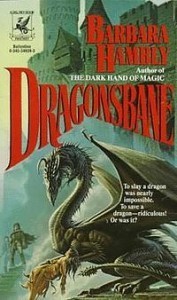 J is for John Aversin, knight, amateur scholar, and relucant dragonslayer in Barbara Hambly's Dragonsbane.
J is for John Aversin, knight, amateur scholar, and relucant dragonslayer in Barbara Hambly's Dragonsbane.
I mentioned both Astrin Ymris and Faramir as soldiers out of necessity rather than inclination, but I think John Aversin in Dragonsbane is probably the epic hero where "sense of duty" is most powerfully drawn. John is the only knight in a remote region that has been abandoned by the larger kingdom that once ruled it (think territories such as Britain following the withdrawal of the Roman Empire, although the world is more medieval/early renaissance) to general lawlessness, incursions by raiders and, in one notable case, a dragon. John doesn't fight the dragon because he wants to (he definitely doesn't), or for glory, but because as the only knight, he feels he has to: it is preying on both the people of the region and the animals they depend on for survival and there is no one else to do the job. He doesn't kill the dragon nobly either, by charging to meet it with a sword, but by catching it asleep, shooting it with poisoned harpoons, and chopping off its wings first with an axe. John Aversin lives in a brutal world and survival is a brutal business.
Here's the thing though, he is not a brute. John at face value is a fairly everyday sort of guy, who like Astrin and Faramir does his fighting out of necessity, not pleasure, and is far more interested in amateur science than fighting dragons (which has a bad habit of getting you messily killed.) One of the things I really like about John Aversin as a character is that he has an inquiring mind. Another is that he is perceptive about people and has compassion for the situation of those less fortunate than himself, but not in a "preachy" way: he just gets in there and does what needs to be done. (He's not necessarily a man of few words though; when he's talking about one of his pet theories he is enthusiastically loquacious.)
So when John is asked to fight another dragon (the real story, by the way; the rest is backstory, not spoilers), this time for the current king of the realm that has abandoned the north, he agrees very reluctantly—in exchange for the promise that the kingdom will again return its armies and its protection to the north. So John Aversin also has that truly heroic quality of being willing to put himself at risk for the greater good. No question, he belongs on this list.
—

Peter Dinklage as Tyrion Lannister in the HBO series, "A Games of Thrones"
T is for Tyrion Lannister, dwarf, all round smart guy, and leader of men in George RR Martin's A Song of Ice and Fire series, beginning with A Game of Thrones.
Several people noted that I didn't include any of George RR Martin's heroines amongst my Six Great Heroines of SFF, although several of them were on the longlist, which concluded my post here. There were definitely several contenders for the "Six Great Heroes" list, however, not least Ned Stark and Jon Snow. But actually, Tyrion Lannister was a fairly easy choice.
No question, Tyrion has a pretty rough row to hoe in the world of Westeros. It isn't easy being a dwarf in a world where knightly prowess is the "coinage that counts." He is also despised and disregarded by his father, the powerful Tywin Lannister. Yet from the beginning, I found Tyrion one of the most intriguing characters in the series. First off, he is smart and able; he is also astute, which is not quite the same thing as being clever, ie he has perception and insight into peoples natures and motivations.
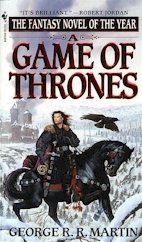 Tyrion is personally brave as well, something that is usually overlooked by those around him because of his stature, and leads a successful military defence of the capital city in the second-in-series, A Clash of Kings. And although as capable of savagery as any character in Martin's brutal world of Westeros, Tyrion is less inclined to it than most and is, I would say, more naturally disposed to kindness and generosity than the majority of the other characters.
Tyrion is personally brave as well, something that is usually overlooked by those around him because of his stature, and leads a successful military defence of the capital city in the second-in-series, A Clash of Kings. And although as capable of savagery as any character in Martin's brutal world of Westeros, Tyrion is less inclined to it than most and is, I would say, more naturally disposed to kindness and generosity than the majority of the other characters.
When I reflect on the A Song of Ice and Fire series Tyrion Lannister is always one of the standout characters and given the stature of the series to date, that has to make him one of the great heroes of epic fantasy.
—
So there it is, not six but seven great heroes of epic fantasy! I think this post is already long enough so I won't add a longlist of "could-also-easily-have-been-on-the-list" characters, as I did with the heroines. But you could help with that—we've already had Lord Mhoram from the first Thomas Covenant series put forward on Friday. What names would you add to the list?
July 8, 2011
Guest Blog Post: Portent and Fate—The Mythic Aspect of Dream and Fulfilment in Contemporary Fantasy
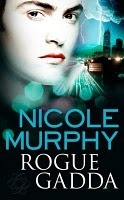 Fellow Harper Voyager author, Nicole Murphy is currently hosting a guest blog series on "Dreams and Fulfilment" to celebrate the launch of Rogue Gadda, the third novel in her The Dream of Asarlai series.
Fellow Harper Voyager author, Nicole Murphy is currently hosting a guest blog series on "Dreams and Fulfilment" to celebrate the launch of Rogue Gadda, the third novel in her The Dream of Asarlai series.
This week has already seen great posts by Kevin J Anderson, Alan Baxter, Mary Victoria, Joanne Anderton and Tansy Rayner Roberts—you can check them all out on Nicole's blog.
Today it's my turn with Portent and Fate—The Mythic Aspect of Dream and Fulfilment in Fantasy so do rock on over and check it out—I'd be very interested to hear your thoughts on portent and fate, and the realisation of dream and 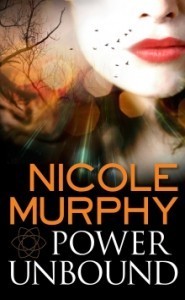
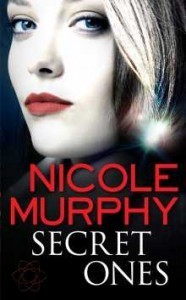 destiny in contemporary Fantasy.
destiny in contemporary Fantasy.
—
Six Great Heroes of Epic Fantasy, Part 2: Now Tomorrow
Because my guest post is up today on Nicole's blog I'll be posting "Six Great Heroes of Epic Fantasy, Part 2″ tomorrow, and not today as originally indicated. My apologies for any inconvenience—but if you haven't read it already, you can read Part 1 here.
July 7, 2011
Six Great Heroes of Epic Fantasy: Part 1
You may recall that my earlier posts on "Six Great Heroines", here and here drew on the whole of SFF, but when I put together my list of "Six Great Heroes" they were all drawn from the epic fantasy subgenre. And, in fact, may yet have to be a magnificent "Seven"—but I shall "wait and see" on that one.
Once again, I am restricting my list to heroes drawn from books, rather than film or television, even though films of tv series may subsequently have been based on some of the stories. (So no, sorry: no Captain Malcolm Reynolds, or anyone at all from Buffy, Battlestar Galactica, or Babylon Five! And yes, I know, they're definitely not epic fantasy, but once The Lord of the Rings films are deducted, the list of potential film/tv candidates in that subgenre grows very thin …)
So here we go, Six Great Heroes of Epic Fantasy, Part the First—and as for the heroines—in alphabetical order.
.
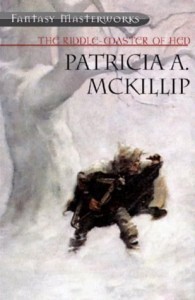 A is for Astrin Ymris, poet, prince, and at need warleader, of Patricia McKillip's The Riddlemaster of Hed trilogy (commencing with the book of the same name.)
A is for Astrin Ymris, poet, prince, and at need warleader, of Patricia McKillip's The Riddlemaster of Hed trilogy (commencing with the book of the same name.)
So why choose Astrin, when he is i) neither the principal or secondary male protagonist of the Riddlemaster tale; and ii) in fact I really like both the two central characters: Morgon, the Riddlemaster, and the minstrel, Deth. By way of answer, The Riddlemaster of Hed has long been one of my favourite Fantasy trilogies and Astrin Ymris was one of the early characters whom I felt epitomized the combination of mysteriousness, magic, and myth that characterized the books.
When we first meet Astrin he is living in exile on a remote moor, digging up shards of the past in an attempt to understand it. Half archaeologist, half wizard, he is in exile for holding to a difficult truth, even though it has estranged him from the brother he loves. He goes on to lose an eye in the conflict that follows the arrival of Morgon and eventually—because of his loyalty to his brother—takes on the role of general of the Ymris armies, at which he excels—although like Cincinnatus, that is neither his preference nor his calling.
I have read a great many fantasy and epic fantasy stories since I first opened The Riddlemaster of Hed, but Astrin Ymris continues to stand out as a character who is original (poet, prince, archaeologist, half wizard, warrior), intelligent, and interesting. No cardboard cutout material here—and a major reason for leading with Astrin is because I believe that the presence of compelling second characters is one of the vital ingredients that really give a book depth.
—
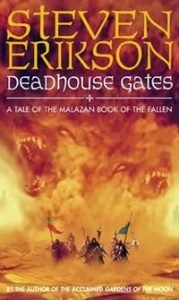 C is for Coltaine, nomad horseman and a general of the Malazan empire in Steven Erikson's Deadhouse Gates, the second of the Malazan Book of the Fallen series.
C is for Coltaine, nomad horseman and a general of the Malazan empire in Steven Erikson's Deadhouse Gates, the second of the Malazan Book of the Fallen series.
Several people have said to me: "when you do the six heroes post you have to include Coltaine. He is so cool." And they are quite right: Coltaine is cool. He is also much more of an archetype than Astrin: i.e. the "barbarian" outsider, regarded with suspicion by many, his loyalty to the empire doubted even though he holds the rank of Fist (general). Yet through his leadership, courage, and sacrifice, Coltaine puts to shame those who fear and doubt him.
In brief, Coltaine is commanded to retreat from a territory that the empire cannot currently hold, including evacuation of the civilian population. The easy option would be to abandon the civilians, but Coltaine doesn't do that. Instead he holds the fighting retreat together in what becomes known as the "Chain of Dogs", a 'great march' in the face of constant privation and hardship as well as battle.
Coltaine is courageous and astute, a strategist and leader—and could so easily be a heroic cutout. But he isn't. The thing about Coltaine is that he is real: you can smell the metal and leather of his armor, and the sweat and dirt. He is human, neither invulnerable nor infallible, but able and determined. So yeah, "C" is definitely for "cool"—it's also for "compelling" and a "character you care about." 'Nuff said, I reckon.
—
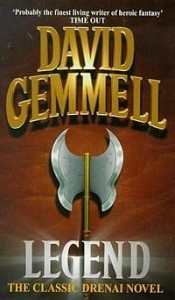 D is for Druss, the legendary axeman of David Gemmell's Legend, the first published, although not the first chronologically of his Drenai novels. (I "think" the first chronologically would be Waylander.)
D is for Druss, the legendary axeman of David Gemmell's Legend, the first published, although not the first chronologically of his Drenai novels. (I "think" the first chronologically would be Waylander.)
On June 13, in my initial post on this year's Gemmell Awards, I mentioned that "I am a long time fan of David Gemmell, particularly his early novels such as Legend, Waylander and The King Beyond the Gate … [and that] … it would be fair to say that David Gemmell was a huge influence on my own love of epic fantasy."
So perhaps my view is coloured by my fandom, but in terms of six great heroes of epic fantasy, I really don't see how I could pass by Druss the Legend. At first glance he is another archetype, the legendary axeman holding together a forlorn hope against overwhelming odds. So why do I see Druss as a standout character? Firstly, and most unusually for a central protagonist, Druss is old. Arthritic, in fact, and definitely slower moving of a morning. Also, he is not a prince, or a knight, or any kind of "chosen one": Druss is of the common people, originally a yeoman farmer before fate intervened.
The central story is also classic epic fare: the desperate Drenai defence against a besieging horde, with Druss playing a pivotal part in that. Here's the thing, though: what makes Druss interesting as a character is that his central conflict is not against the Nadir horde, but with encroaching age and death, and also with the dichotomy between reality and his own legend. Gemmell's great achievement with this character, in my humble opinion, is that to those around him he is Druss the Legend while we, as readers, know him as Druss the man—yet remain convinced by the legend.
—
So there you have it, the first three of my "Six Great Heroes of Epic Fantasy." I shall return tomorrow, the tutelaries of the blogosphere allowing, with the final three—or will it be four? Stay posted! In the meantime, who else would you put on the list? Who, in your opinion, cannot be left off? And why do you hold that view?
July 6, 2011
"Gathering" News; Plus Tales for Canterbury: A Peek Inside "Sign of the Tui"
I know I semi-promised you "Six Heroes of SFF" today, but that has—I am sorry, yes, entirely by blogmaster's fiat!—been deferred until tomorrow.
The Gathering of the Lost News:
Instead I want to share the great good news, especially for those of you who were counting down with me on the great race to meet the 1 July deadline, that my editor, Kate, at Harper Voyager US, has now read the Gathering manuscript I submitted last Thursday and is tres happy, so it's full steam ahead for that March publication deadline. WOOT! Rejoice with me—but now, holiday! And then straight onwards to Daughter of Blood (note: working title.)
—
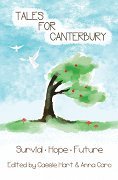 Tales for Canterbury: A Peek Inside "Sign of the Tui" by Tim Jones
Tales for Canterbury: A Peek Inside "Sign of the Tui" by Tim JonesOn June 23, I published the first "peek inside" Tales for Canterbury, an anthology of short fiction put together by Cassie Hart and Anna Caro and divided into three sections: Survival — Hope — Future. The anthology includes a range of short stories donated by both national and international authors as a fundraiser for the Red Cross Christchurch Earthquake Appeal.
The "peek inside" involves featuring the first paragraph 'or so' (if the paras are very short, but within the bounds of fair use) of some of the stories over the next while. I do hope it will encourage readers to not just take my word for Tales for Canterbury's quality but also to give it a try for themselves.
I began with my own short contribution, The Fountain, which appears in the Hope section of the anthology. Today I am continuing with another short story from the Hope section, Tim Jones' "Sign of the Tui":
.
Sign of the Tui
Tim Jones
First Brian was going to meet me at the airport, then he said he was too
busy. I ended up taking a shuttle into town. Nothing I'd seen on TV,
nothing I'd watched on YouTube, could prepare me for the reality: the
city I was born in, demolished by earthquake and aftermath.
The further east we went, the worse everything got, till I felt that I
had been transported out of Christchurch and into Afghanistan. It was a
hot day, the nor-wester arch hovering over the plains. Sweat chafed my
armpits and thighs. The shuttle bobbed and weaved down cracked streets
towards my parents' house. "Here you are," said the driver, and dropped
me in front of the rubble.
I squared my shoulders and hefted my pack. Better get this over with.
Brian was in the back garden, pacing around on grass grown to a length
my dad could never have abided. He was on his mobile, running his
business by remote control, keeping his team in line.
He saw me and closed his hand over the phone. "Put up the tent," he
said.
There were so many things I could have said to that, of which "Put it
up yourself, you prick" would have been the mildest. I said nothing and
got my tent out of my pack.
…
To read more, of both Sign of the Tui and all the other wonderful stories comprising Tales for Canterbury, and support the Christchurch earthquake recovery effort, consider purchasing your own electronic or hard copy edition of Tales for Canterbury, here.
To learn more about Tim Jones and his writing, you can check out his blog, Books in the Trees.
July 5, 2011
Life After Deadline
On Monday I reflected some more on the journey to meeting deadline and today it's all about what happens next in the writing life (of this particular writer, at least) because the one thing you can be sure of is that there is always plenty to do.
Initially, I have to tread water a bit in terms of Gathering, while I wait for feedback from Kate, my editor at Harper Voyager. While I'm doing that, I'm also getting organised to achieve a few other goals, including:
Participating in fellow Harper Voyager author, Nicole Murphy's guest blog series on "Dreams and Fulfilment" to celebrate the launch of her third-in-series, Rogue Gadda . There have already been two great posts from guest authors Kevin J Anderson, here, and Alan Baxter, here . My guest post will be up this Saturday, 9 July, so I'd love it if you were to drop by and maybe even leave a comment—but no pressure!

Reading for the Hugo Awards —I know I've mentioned this a couple of times now, but the deadline for voting is July 31 so I seriously need to "get reading." I have four of the 5 novels 'in hand': NK Jemisin's The Hundred Thousand Kingdoms, Mira Grant's Feed , Ian McDonald's The Dervish House and Connie Willis's Blackout . The only novel currently outstanding is Lois McMaster Bujold's Cryoburn , which is her latest Miles Vorkosigan story. There are also short stories, novelets and novellas to be gotten through so as you can probably guess, I am going to be 'reading like anything.' I am looking forward to it—and also thanking my stars that I am a fast reader! Anyway, "more soon" on this one.
I also have a few books to read with a view to possible interviews for the radio station as well as right here on the blog—so stay posted for more news on these possibilities as books get read and events develop.
Highest on the agenda though, as soon as I've heard back from Kate and can start making plans, is the all important holiday. I definitely think I deserve one—although, of course, given the way things have worked out, I'll be ready to 'fly away' just as the midwinter school holidays start. Not so knacky re the timing, but then again, opportunities must be seized as they arise rather than waiting for the perfect time—which of course never comes.
Once the holiday is done there'll be the copyedit of The Gathering of the Lost to think about, but most importantly, I'll be wanting to start work on The Wall of Night Series, Book Three—working title, Daughter of Blood . The excitement never stops!
July 4, 2011
Tuesday Poem: "Midwinter"
Already noon
and the bright midwinter sun
only now taking
the iron-hard edge
off the frost…
… so many tasks wait,
stealth weeds creeping
between bricks and shrubs,
the guttering that becomes
a waterfall in heavy rain
overflowing with leaves
as I watch the steam
curl from my coffee cup;
the sun peers in the bay
window, waits for the cat
to stir from my lap,
for my hand to turn
the last page in my book.
.
© Helen Lowe, 2011
.
—
I seem to be in the mode for what I would call "occasional" poems—and definitely with a "domestic" theme, ie these are not poems about venturing out into the world; quite clearly the opposite, in fact, with Midwinter.
Once again, enjoy. And as always, feedback is welcome.
—
For more great Tuesday poems and to read the guest poet featured on the Tuesday Poem Hub, either click here or on the Quill icon in the sidebar.
July 3, 2011
Reflections on Meeting Deadline & Oscar Speech (ie Many "Thank Yous")
Reflections:
I know I talked a little bit last week about not just meeting my deadline but actually getting to it a day ahead, but I really do want to reflect on it all a bit more now, if you will 'bear with me.':)
In the first instance, coming in on schedule was just great because having had earlier goals "quaked" as a result of February 22nd, it just felt really good to have achieved something. Not least because the first half of this year has otherwise felt very much, whole-of-life wise, like continually sliding back to square one in a particularly virulent game of snakes and ladders. So a goal achieved is just a really nice feeling.
I also really wanted to "make" 1 July as that means that The Gathering of the Lost will be published in March 2012 in the US. This is important to me for several reasons. The first is that I feel that 18 months is toward the farthest end of what it is reasonable to ask readers to wait for a next-in-series—part of that unwritten contract that I feel exists between authors and readers, when doing a series like The Wall of Night. The second—and to me, at least, this is almost as important as the first—is that in many ways Gathering is a springtime book. It is set in a different part of the Haarth world to the Wall of Night, where the cultures are more colourful and diverse—and there are not only festivals, chivalry and tourneys, but also songs of springtime love … So I think the "energy" for the book will be "right", coming in with the spring and the sunshine.
When I blogged on the Supernatural Underground on Friday 1, here, I also talked about the importance to me of "writing the story I wanted to write." At one level you may say: "Duh, obvious. Why else would you write?" Why, indeed?! But I feel that there are two levels of writing—just getting the fundamental story out there, then the second level that is all about depth, detail and nuance. So rather than having a sketch in greytone, admittedly one with all the basic characters and action present, you bring in both the flesh tones and the jewel bright accent colours, as well as the fine strokes that delineate muscle and denote character, expression and action. In short, you have a painting, not just a sketch.
The work that I have been doing on Gathering over these past few months has been all about making sure that every part of the book is a painting and not a sketch. For me, that is part of the faith that I have to keep as an author, not just with readers in terms of offering quality, but also with the story itself—to do my best to do justice to all that it can be. I feel that in this case I really have given it my all, a feeling that definitely adds to the sense of completion: I truy have done all that I can do—and the rest, from this point, in terms of the book and the world, really is completely outside my control.
The 'Oscar Acceptance Speech', aka Many Thank Yous:
In my Supernatural Underground post, I also mentioned some of the wonderful people without whom I would almost certainly not have made 1 July. What I talked about under "More Earthquakes" was the second 6.3 earthquake (technically, apparently, an 'aftershock' of the February 22nd 6.3 'quake—rolls eyes) that resulted in further liquefaction and need for digging out of a sea of sludge/mud around our property—and the wonderful friends who pitched in and helped do this so I could keep working on the book. You can read the long version on the Supernatural Underground post, but basically I named and thanked them there and intend to do it again right now:
Andrew, Joffre; Dave; Caroline; Susi; Peter; Fitz; Ram; Shane; and Chris: without your help post June 13, I would not have met my 1 July deadline for the book so my very sincere thank to you all. You definitely rock—not least because I know we're all so tired of doing this, over and over again.
Another person who also gets a long overdue acknowledgment and huge thanks for 'services to the cause of meeting book deadline' is Mary Victoria. For 3 weeks in late April/May, Mary and her husband Frank gave me the use of their beautiful home in Wellington for a dedicated writing retreat away from more or less continual aftershocks, mud, dust, portaloos, streets like old river beds with potholes large enough to swallow cars etc—ie a peaceful haven which, without the struggle of day-to-day just managing, really enabled me to get traction on the book.
So Mary, Frank: again with the big thank you. You have definitely been part of the solution.
Another huge vote of thanks goes to my editor, Kate, at HarperVoyager, for her patience, understanding and encouragement under very trying circumstances, as well as to the UK team at Orbit who have also been consistent in their concern and support. And the same to my agent, Robin, and her assistant, Beth, who have always been there as required to keep the path as smooth as possible (despite those riverbed roads!) and solution focused.
And last, but never least, to my partner Andrew for his unfailing encouragement and support, as always. Good times, bad times—what more can you say?
Other than "I'll be back", in this case on Wednesday—because tomorrow is Tuesday Poem day, & yes, I do have another new one for you!—with what's coming up for "life after deadline." (If you read yesterday's post you'll already know I've been luxuriating in a spot of reading over the weekend.) And for Thursday, I don't know for sure, but I've been thinking it really is time I started talking about those Six Great Heroes of SFF, to go with the heroines posts in May (here and here) …
July 2, 2011
What I'm Reading: "Under Heaven" (Guy Gavriel Kay) & "My Iron Spine" (Helen Rickerby)
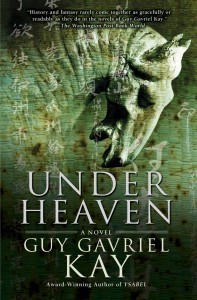 One of the great things about having met a book deadline is that one can then (for at least a few hours) put one's feet up and relax with a good book—a story, what's more, written by someone other than oneself!
One of the great things about having met a book deadline is that one can then (for at least a few hours) put one's feet up and relax with a good book—a story, what's more, written by someone other than oneself!
In my 1 May post on the Supernatural Underground I talked about 'comfort reads': returning to those books that are like old friends. Returning to an author you have liked before, although with a new book, can be a similar process—you hope for that "old friend" feeling of a writing style that you love; the familiar magic of a tale well told. Guy Gavriel Kay has been one of those authors for me for some time now—I love the poetry and High Romantic style of his Fionavar trilogy (The Summer Tree; The Wandering Fire; The Longest Road) and his first standalone, Tigana, is probably one of my favourite books. I also very much enjoyed A Song for Arbonne and The Lions of Al-Rassan. Some of his more recent works have disappointed me a little, however, so it was with some trepidation that I treated myself to a very nice trade paperback edition of his latest novel, Under Heaven.
Firstly, I loved the cover, and although one may not judge a book by its cover, one that 'speaks' to you and draws you in is always a great help! And I liked the blurb a lot:
"Honour is Beyond Measure
But It's Price May Be An Empire …
For two years Shen Tai has mourned his celebrated father and lived like a hermit beyond the borders of the Kitan Empire. There, by a mountain lake, the bones of the soldiers killed in great battles between the Kitai and the Tagurans lie unburied and their wailing ghosts strike terror into the living.
… (Now) … Tai will be given two hundred and fifty Sardian horses by the Tagurans, legendary steeds from the far west, as a reward for his courage and piety … to give a man even one of the famed Sardians is to honour him greatly; to give him so many 1s a reward which would overwhelm an emperor, and could be Tai's death warrant."
I am about halfway through currently and I am very happy to say that I am really enjoying the read—this is definitely Guy Gavriel Kay at his best: rich storytelling, subtleties of plot and great characterization. And for those of you who like a little bit of romance with your epic adventuring and game of kingdoms, there is at least one very nice one here to be enjoyed.
—
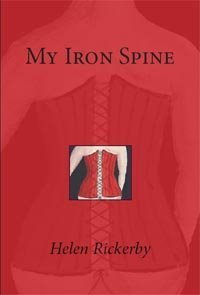 Helen Rickerby is a fellow Tuesday Poem Blog poet and My Iron Spine (Headworx) is her second collection of poetry. As those of you who follow my Tuesday Poem postings are probably aware by now, I am a huge admirer of Helen's work and so had been meaning to buy My Iron Spine for ages. Recently I did just that and am finally starting to read it—and so far, I have to say, I love every poem I've read (I am about a 1/3 of the way through.) Why? Well as a poet myself, I believe that Helen's structure is very strong and her poems have emotional resonance as well as a great deal of wry humour. Definitely "I like" territory for the Lowe gal.
Helen Rickerby is a fellow Tuesday Poem Blog poet and My Iron Spine (Headworx) is her second collection of poetry. As those of you who follow my Tuesday Poem postings are probably aware by now, I am a huge admirer of Helen's work and so had been meaning to buy My Iron Spine for ages. Recently I did just that and am finally starting to read it—and so far, I have to say, I love every poem I've read (I am about a 1/3 of the way through.) Why? Well as a poet myself, I believe that Helen's structure is very strong and her poems have emotional resonance as well as a great deal of wry humour. Definitely "I like" territory for the Lowe gal.
July 1, 2011
Draw Result: Birthday-of-the-Blog Grand Book Giveaway Competition
The "Happy Birthday to ' … on Anything, Really', grand book giveaway competition has now been drawn.
For absolute fairness, all names were entered into the database in the order comments were made, from May 31 until June 30.
Each of the three draws was then made separately with the following result:
The Grand Epic Fantasy Giveaway Set Winner is: DonnaS
The Grand YA Fantasy Giveaway Set Winner is: Wen Baragrey
The Grand NZ Poetry Giveaway Set Winner is: Morag
Congratulations to all the winners and to everyone who participated and helped make my "Birthday of the Blog" celebration special—as well as getting me through the last month to book delivery deadline. You definitely all helped keep me going, especially with the "toots/honks/beeps" on June 22! 
—
Winners: If you contact me through my website with a postal address I will get your books in the mail.
If the prizes have not been claimed within 1 week, ie by July 8, I will redraw any or all categories on July 9.
Supernatural Underground: 1 Year On: Plus …
I have my regular Supernatural Underground blog post up today titled:
Yes, I've been blogging on the Supernatural Underground on the first day of every month for a year now . Hard to believe where all that time's flown away to!
Today's post is a wrap-up of the past month—just getting through it mainly! Do head on over and check it out.:)
And as always, feel free to leave a comment if the spirit so moves you! 



